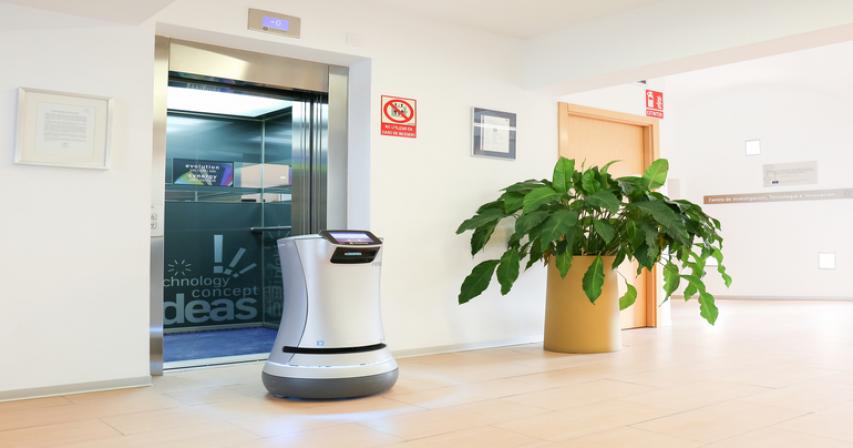thyssenkrupp launches elevator interface to allow multi-level robot movement throughout hotels, hospitals and other buildings

thyssenkrupp launches elevator interface to allow multi-level robot movement
throughout hotels, hospitals and other buildings
Interface eliminates restrictions previously impacting robot movement in buildings,
allowing them to move freely regardless of building size or height
Robotics elevator interface launch reinforces thyssenkrupp’s commitment to
creating smarter building transportation solutions through advanced engineering
thyssenkrupp Elevator North America has launched a robotics interface platform to assist
with robot delivery services throughout buildings. By incorporating the elevator interface with
delivery robots, building owners and managers can improve inhouse logistics, increase
productivity and maximize the tenant experience.
Previously, robots could not operate independently and use elevators, severely limiting their
use within a multi-story building. Now, thyssenkrupp’s sophisticated interface allows
communication between the robot and the elevator, which enables robots to make floor
selections and use elevators like a normal passenger.
“thyssenkrupp Elevator is helping shape the smart cities of the future with our innovative
technologies and solutions that make passenger movement safer and more efficient for
everyone, including robots,” said Kevin Lavallee, CEO of thyssenkrupp Elevator North
America.
Successful pilot projects have been completed at prominent hotels and hospitals across the
U.S., as thyssenkrupp has partnered with leading robot manufacturers on these pilot
projects. Robotic elevator interfaces can be implemented to assist with housekeeping, room
and luggage service; assist robotic security guards and concierges; as well as aid in
pharmaceutical and package delivery.
The interface permits robots to act like human passengers, placing a call for an elevator via
WiFi or 4G LTE, selecting a floor and then exiting the elevator upon reaching its destination.
Using Machine Vision, a robot can determine if an elevator has enough room or if it’s too full
to accommodate the robot.
All elevator communication is done wirelessly through thyssenkrupp’s TAC family of
controllers. The interface, which is only compatible with thyssenkrupp software and
hardware, can be installed in as little as one day.
thyssenkrupp Elevator AG, thyssenkrupp Allee 1, 45143 Essen, Germany
P: +49 201 844 - 0, F: +49 201 844 - 536000, [email protected], www.thyssenkrupp-elevator.com
Chairman of the Supervisory Board: N.N., Executive Board: Peter Walker (Chairman), Ercan Keles, Dr. Detlef Hunsdiek
Company domicile: Düsseldorf, Commercial register: Düsseldorf HR B 47444
October 17, 2019
Page 2/3
According to MarketsandMarketsTM, the delivery robot market is expected to grow from $11.9
million USD in 2018 to $34 million USD in 2024. Hotels are increasingly testing this
technology due to labor savings, increased revenue from room service as well as increased
occupancy and room rates. Meanwhile, hospitals are utilizing robots for deliveries to and from
pharmacies, laboratories, blood banks, nurse stations, waiting rooms, patient rooms,
administrative offices and gift shops.
“Technology-savvy organizations in pursuit of improved operational efficiencies are
embracing the virtually unlimited potential of this technology and how they can implement
robots and the elevator interface into their day-to-day activities,” continued Lavallee.
This is not thyssenkrupp Elevator’s first foray into the world of robotics. In 2017,
thyssenkrupp announced the launch of pilot project in which delivery robots would transport
spare parts and other materials from the warehouse to elevator maintenance job sites faster
and more efficiently.
In addition to robotics, thyssenkrupp has recently launched two technological advancements
poised to revolutionize elevator efficiency – MAX and AGILE. MAX is the elevator industry’s
first real-time, cloud-based predictive maintenance solution that identifies issues before they
occur, increasing elevator availability and reducing downtime. There are currently more than
100,000 units installed worldwide.
Meanwhile, the AGILE elevator enhancement package allows building managers to more
intelligently group and assign passengers to elevators, move people more rapidly to their
destination, adjust passenger flow in real-time and personalize touchscreens and kiosks.
AGILE bridges the gap between traditional elevator systems and the elevators of the future
by providing a smart environment of unprecedented connectivity and personalization.






Comments